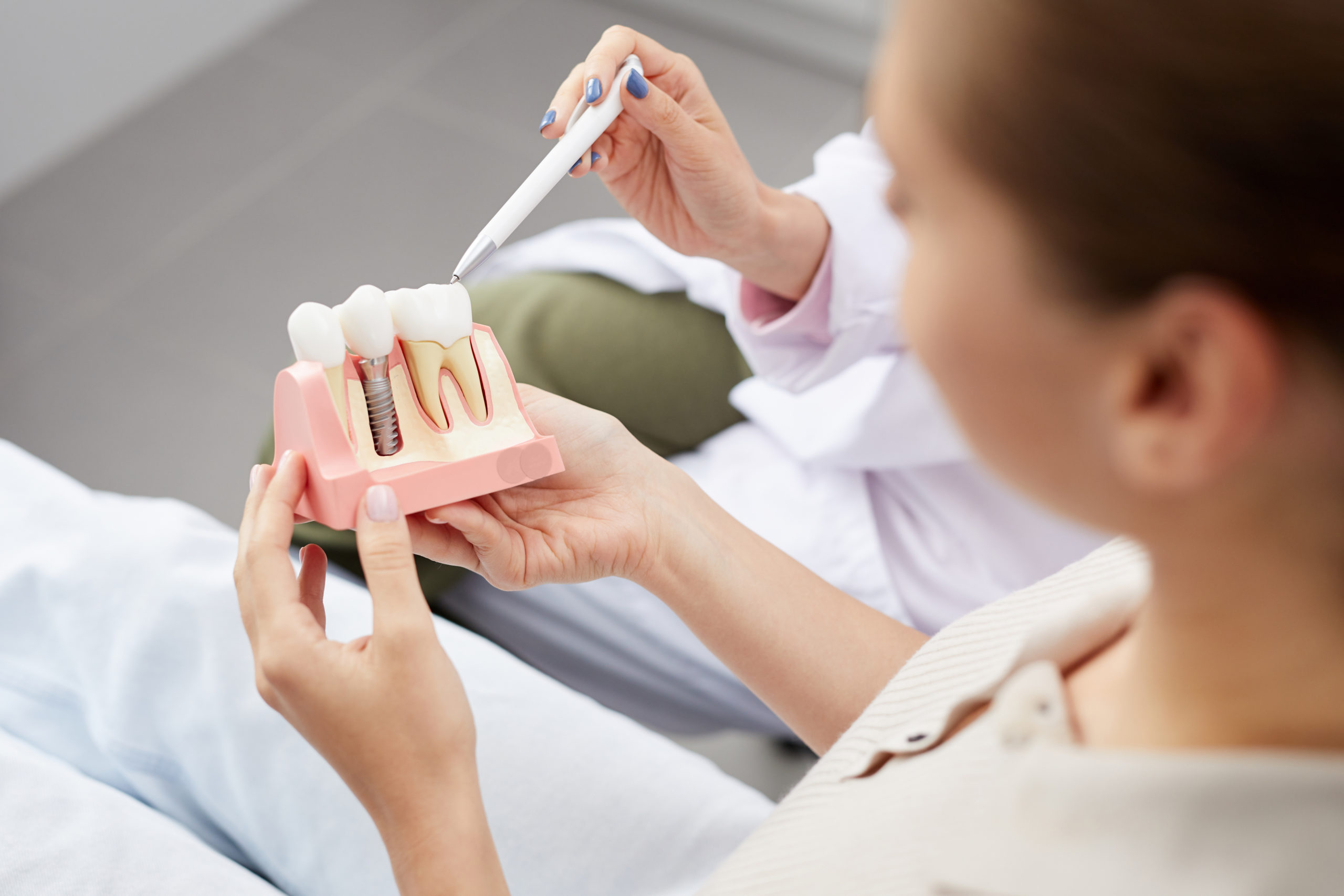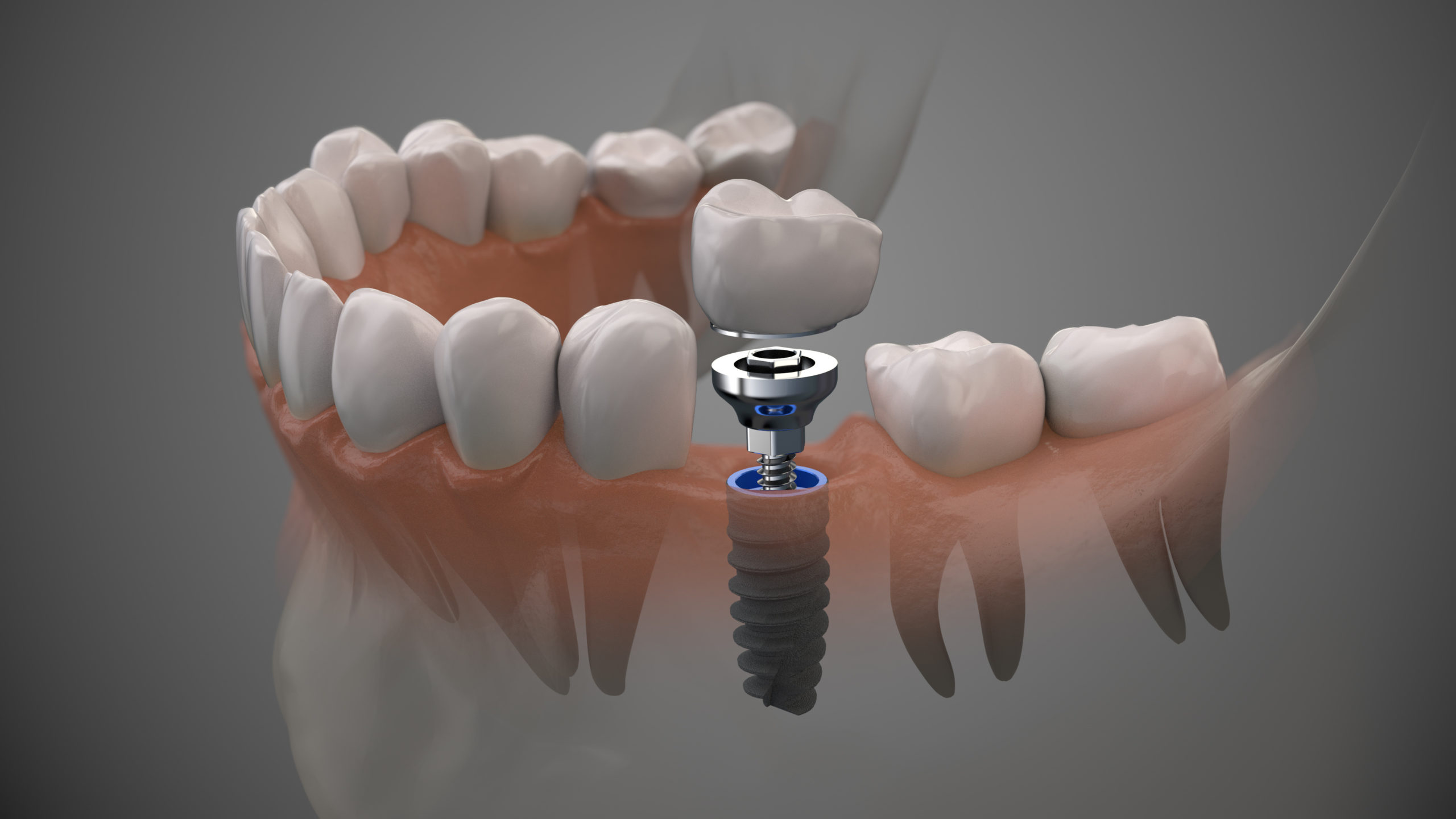Restoring a smile with the next best thing to natural teeth. Dental implants use titanium posts placed in the jaw to support a replacement tooth or a bridge to replace multiple missing teeth. Implants act just like tooth roots and fuse to the jawbone, becoming a very long-lasting replacement.
Can I have an implant?
If you have enough bone density, then having an implant will not be a problem. Your implant needs plenty of bone to fuse to so we first assess the health of your jaw. If there has been any loss of bone tissue, we can use a bone graft to encourage the tissue to replenish. In some cases of severe gum disease, it’s necessary for us to replenish lost bone to help the structure and health of your jaw.
Why have an implant?
Teeth can be lost as a result of gum disease, dental decay and injury. Having a missing tooth can greatly impact self-confidence, especially if the gap is visible when you smile. While there are different options available for replacing missing teeth, implants are the best solution as they are long-lasting, secure, and strengthen your jaw. Implants are also incredibly versatile and can even be used to retain dentures.

What is involved in having an implant placed?
First appointment
It takes several appointments for us to place an implant and restore a missing tooth. We start with an initial consultation where we discuss in detail your treatment plan and how long we envisage the treatment will take.
Assessment
We take x-rays and scans of your mouth so we can get a clear picture of your jaw. It’s important that there is enough bone density to support an implant. We use these x-rays and scans to locate the best spot for us to place the implant. If we are replacing a single missing tooth, the implant will be placed where the tooth root used to be.
Placing the implant
We always use anaesthetic and make sure you are completely at ease when having the implant placed. We place a temporary crown or bridge at the site to keep the area protected while the implant fuses and heals. It takes a few months for the implant to fully fuse to the jawbone. Once it has healed, we arrange for the top of the implant to be exposed from the gum so we can take impressions of the area.
Preparing for the restoration
Whether you are having a crown or a bridge affixed to your implant, we will need to take impressions so we can create perfect replacement teeth. These impressions are then used by a dental lab where your new teeth will be made from tooth-like porcelain. Once they have been crafted and sent back to us, we arrange for the fitting.
Fitting the replacement teeth
The fitting makes the treatment worth the wait when you can see yourself with a full smile again. We check your crown or bridge to ensure a perfect fit, and make sure you are happy with the final look before fixing it to the implant using strong dental adhesive.

Looking after your implants
Just like with natural teeth, implants will last longer if you keep up with a regular and thorough cleaning routine. While the replacement teeth are resistant to bacteria, the supporting gum tissue and bone are not. Keeping your mouth clear of bacteria will make sure your implants last just as long as your natural teeth.

Frequently Asked Question
Most people are suitable for dental implant treatment, providing they are in good general and oral health. They are not an ideal option for everyone, but we will talk through your individual case, and if we think implants will be the best choice for you, at your initial consultation appointment.
You won’t feel any pain during your dental implant surgery, as we use local anaesthetic to numb the area and make sure you are feeling comfortable before and during the procedure. Following treatment, you will likely feel some discomfort, which can be managed with pain medication as advised by your dentist. Implant treatment is actually often less painful than having a tooth extracted.
In some cases, often if a tooth has been missing for a significant amount of time, or the condition of the teeth has deteriorated, there can be a loss of bone in the jaw as a result. This would prevent the successful placement of a dental implant, which needs to fuse to the natural jawbone to provide a solid foundation. With a bone graft, we can help return this stability and add enough bone density for implant placement.
If you look after them carefully, your dental implants have the potential to last for the rest of your life. Keep up with a great oral hygiene routine at home, including brushing and flossing twice a day, and make sure you visit your dentist for regular check ups. The crown or bridge fixed on top of your implant will likely need to be replaced over time due to general wear and tear, but this can be easily done in our practice.
The main alternatives to dental implants are to have a bridge or denture fitted. These restorations are less expensive than an implant but don’t have the same stability or incredible aesthetics. We will talk you through all the options available to you at your initial consultation and find the best suited to your individual case.
No, not at all! Dental implants look, feel and function just like natural teeth. As they are fused to your jawbone, implants are very secure and will not slip or move when you talk or eat. We create highly aesthetic crowns to fix on top of your implant so no one will be able to tell you have an implant.
The best way to look after your dental implants is to treat them as you do your natural teeth. Brush and floss regularly and visit your dentist for regular check up appointments so they can keep an eye on your implants and spot any potential problems early.

